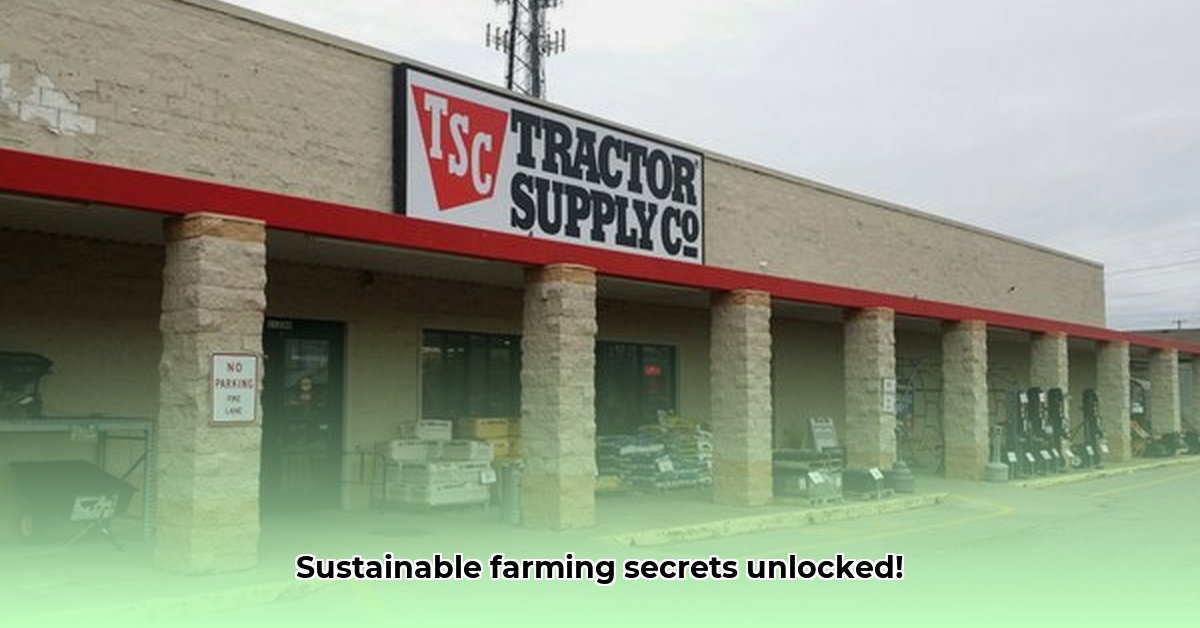
Tractor Supply Munfordville Kentucky: A Sustainable Farming Resource?
Tractor Supply Company (TSC) holds a prominent position in Kentucky's agricultural landscape. This article assesses the Munfordville, KY, store's contribution to sustainable farming practices, examining both its strengths and weaknesses, and offering actionable steps for improvement. We'll explore TSC's product offerings, analyze its impact (positive and negative), and propose strategies for a more sustainable future. For another Kentucky TSC example, check out this Campbellsville store.
Tractor Supply Munfordville Kentucky: Product Offerings for Sustainable Farming
The Munfordville TSC, like its counterparts, stocks a range of products potentially supporting sustainable agriculture. These include fencing materials for rotational grazing (a key practice for improving pasture health and reducing soil erosion), various organic animal feeds (contributing to animal welfare and minimizing environmental impact), and water-efficient irrigation tools. The store also carries seeds, soil amendments, and gardening supplies beneficial for sustainable home gardening practices. However, product availability is subject to seasonal fluctuations and local demand. It's advisable for consumers to check in-store or call ahead for product verification.
TSC's Impact: A Balanced Perspective
The accessibility of TSC stores presents a significant advantage for Kentucky farmers. Their convenient location allows for quick acquisition of essential supplies, ensuring timely interventions critical for successful farming operations. This ready access is a substantial positive. However, a lack of transparency regarding supply chain sustainability presents a counterpoint. TSC's website currently lacks detailed information about the sourcing of its products, raising concerns among environmentally conscious consumers and farmers. Where are these products originating from, and what are their production processes? The absence of this critical information hinders informed decision-making. Additionally, the level of staff knowledge regarding sustainable agricultural practices varies. While some employees are knowledgeable, inconsistent training across staff members presents a challenge for those seeking guidance on eco-friendly farming solutions.
Building a More Sustainable Future: Collaborative Action
Enhancing the sustainability of Kentucky agriculture through TSC requires a collaborative approach. The following actions are categorized by stakeholder:
Actionable Steps for Increased Sustainability
1. Tractor Supply Company (TSC): Implement regular supply chain audits to identify and mitigate environmental impacts. Develop and publicly release a comprehensive sustainability plan including details on product sourcing, certifications, and staff training programs.
2. Kentucky Farmers: Adopt precision agriculture techniques such as GPS-guided machinery to optimize resource utilization. Actively invest in ongoing education on sustainable agricultural practices and establish systematic methods for tracking resource consumption and environmental impact.
3. Kentucky Government: Provide financial support through grants and tax incentives to encourage the adoption of sustainable agricultural technologies. Fund research projects specific to Kentucky's climate and agricultural products. Invest heavily in farmer education and outreach programs focused on environmental sustainability.
4. Consumers: Engage directly with TSC staff and management, actively inquiring about product sustainability. Support businesses demonstrably committed to ethical and environmentally sound practices. Hold companies accountable for their environmental footprint by demanding transparency and responsible sourcing.
Conclusion: A Shared Responsibility
Tractor Supply's role in Kentucky's sustainable agriculture landscape is complex. While the convenience of its stores greatly benefits farmers, improving transparency regarding product sourcing and staff training is crucial. The path toward a greener future demands a collaborative effort involving TSC, farmers, the government, and consumers. By demanding transparency and supporting businesses committed to sustainability, we can collectively drive meaningful positive change in Kentucky's agricultural practices.